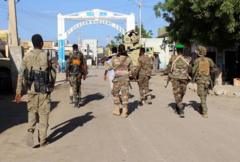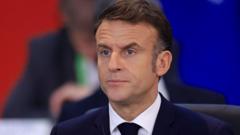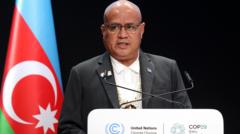In light of Trump's emerging presidency, Somaliland expresses optimism for formal U.S. recognition, while opposing voices in Somalia warn of regional destabilization and sovereignty concerns, igniting a complex geopolitical discourse.
Somaliland's Hope for U.S. Recognition Under Trump Administration

Somaliland's Hope for U.S. Recognition Under Trump Administration
As Somaliland eyes potential recognition from the U.S. under Donald Trump's presidency, contrasting sentiments arise from within its territory and Somalia.
---
Amidst rising political tides, Somaliland, a self-declared republic seeking independence from Somalia, holds onto hope that the United States under Donald Trump will be the first to recognize its statehood. The region declared independence 33 years ago, following Somalia's civil war, and has since functioned largely as an autonomous nation. Aisha Ismail, a university student in Hargeisa, excitedly anticipates Trump's potential acknowledgment of Somaliland, stating, "Donald is our savior. He is a wise and practical man."
Conversely, opinions from Mogadishu reflect concern and anger. "I doubt Donald Trump knows what Somaliland is," laments Abdi Mohamud, a data analyst, who expresses frustration at the sentiment of hope from Ismail. Yet, there's new momentum from influential Republican figures like Congressman Scott Perry, who recently proposed legislation for U.S. recognition of Somaliland. This development aligns with a conservative roadmap for Trump's presidency, indicating the potential for a shift in U.S. foreign policy.
Though the blueprint suggests recognition of Somaliland, it also reveals that Africa remains a low priority, as demonstrated by the limited pages dedicated to the continent in a comprehensive plan compiled by the Heritage Foundation and conservative organizations. This raises questions about whether the incoming administration will adhere to such proposals, especially considering the historical costs of involvement in Somalia, particularly during the infamous "Black Hawk Down" incident.
Somali officials, including Foreign Affairs Minister Ali Omar Balcad, caution against U.S. recognition of Somaliland, arguing it could undermine Somalia's sovereignty and create regional instability. The African Union shares similar sentiments, underscoring the precedent it may set for separatist movements globally.
As the Trump administration prepares, concerns linger regarding the American military presence in Somalia, where approximately 500 troops are currently stationed. This presence is crucial in combatting al-Shabab, an insurgent group posing threats to regional stability.
Additionally, the relationship with Somaliland has become contentious, especially following negotiations with Ethiopia regarding recognition in exchange for port access. In light of this, Somalia has hired lobbyists to manage its relations with the looming Trump administration, signaling its apprehension about potential policy shifts.
Republican strategists advocate for Somaliland's recognition for various U.S. interests, including economic and military considerations. They highlight Somaliland's commitment to democratic principles and its strategic coastline along vital shipping lanes. Experts note that representing Somaliland as a viable business opportunity may resonate with Trump's deal-making disposition, creating a potential channel for recognizing Somaliland in exchange for favorable terms.
However, experts like Ken Menkhaus remind that volatile shifts in policy may ensue, particularly as Trump’s skepticism of foreign aid and state-building could redefine the dynamics in the Horn of Africa. Uncertainties abound, yet one thing seems clear: the impending administration may herald significant shifts in U.S. engagement with Somaliland and Somalia alike. As developments unfold, all eyes remain on how Trump’s approach might reshape the political landscape in this complex and deeply rooted regional conflict.
Amidst rising political tides, Somaliland, a self-declared republic seeking independence from Somalia, holds onto hope that the United States under Donald Trump will be the first to recognize its statehood. The region declared independence 33 years ago, following Somalia's civil war, and has since functioned largely as an autonomous nation. Aisha Ismail, a university student in Hargeisa, excitedly anticipates Trump's potential acknowledgment of Somaliland, stating, "Donald is our savior. He is a wise and practical man."
Conversely, opinions from Mogadishu reflect concern and anger. "I doubt Donald Trump knows what Somaliland is," laments Abdi Mohamud, a data analyst, who expresses frustration at the sentiment of hope from Ismail. Yet, there's new momentum from influential Republican figures like Congressman Scott Perry, who recently proposed legislation for U.S. recognition of Somaliland. This development aligns with a conservative roadmap for Trump's presidency, indicating the potential for a shift in U.S. foreign policy.
Though the blueprint suggests recognition of Somaliland, it also reveals that Africa remains a low priority, as demonstrated by the limited pages dedicated to the continent in a comprehensive plan compiled by the Heritage Foundation and conservative organizations. This raises questions about whether the incoming administration will adhere to such proposals, especially considering the historical costs of involvement in Somalia, particularly during the infamous "Black Hawk Down" incident.
Somali officials, including Foreign Affairs Minister Ali Omar Balcad, caution against U.S. recognition of Somaliland, arguing it could undermine Somalia's sovereignty and create regional instability. The African Union shares similar sentiments, underscoring the precedent it may set for separatist movements globally.
As the Trump administration prepares, concerns linger regarding the American military presence in Somalia, where approximately 500 troops are currently stationed. This presence is crucial in combatting al-Shabab, an insurgent group posing threats to regional stability.
Additionally, the relationship with Somaliland has become contentious, especially following negotiations with Ethiopia regarding recognition in exchange for port access. In light of this, Somalia has hired lobbyists to manage its relations with the looming Trump administration, signaling its apprehension about potential policy shifts.
Republican strategists advocate for Somaliland's recognition for various U.S. interests, including economic and military considerations. They highlight Somaliland's commitment to democratic principles and its strategic coastline along vital shipping lanes. Experts note that representing Somaliland as a viable business opportunity may resonate with Trump's deal-making disposition, creating a potential channel for recognizing Somaliland in exchange for favorable terms.
However, experts like Ken Menkhaus remind that volatile shifts in policy may ensue, particularly as Trump’s skepticism of foreign aid and state-building could redefine the dynamics in the Horn of Africa. Uncertainties abound, yet one thing seems clear: the impending administration may herald significant shifts in U.S. engagement with Somaliland and Somalia alike. As developments unfold, all eyes remain on how Trump’s approach might reshape the political landscape in this complex and deeply rooted regional conflict.




















